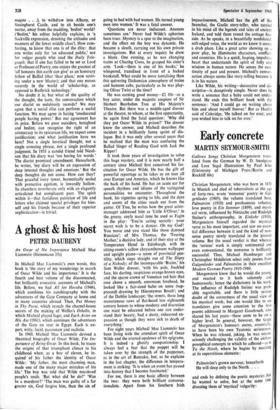A ghost & his host
PETER DAUBENY
In Micheal Mac Liamm6ir's own words, this book is `the story of my wanderings in search of Oscar Wilde and his importance.' It is the fourth and best volume of the disconnected, but brilliantly evocative, accounts of Micheal's life. Before, we had All for Hecuba (1946), which combines his autobiography with the adventures of the Gate Company at home and in many countries abroad. Then, Put Money in Thy Purse, which reveals the charnel-house secrets of the making of Welles's Othello, in which Micheal played Iago; and Each Actor on His Ass (1961), which continues the adventures of the Gate on tour in Egypt. Each is ex- pert, witty, lucid, passionate and realistic.
In 1960, Micheal Mac Liamm6ir devised a theatrical biography of Oscar Wilde, The Im- portance of Being Oscar. In this book, he traces the origins of that triumphant climax to his childhood when, as a boy of eleven, he in- quired of his father the identity of Oscar Wilde: 'My father, the most charming man, made one of the many major mistakes of his life.'. The boy was told that Wilde murdered people's souls. 'But what did he do?' Was he a murderer?' The man was guilty of a far greater sin, God forgive him, than the sin of going to bed with bad women. He turned young men into women.' It was a fatal answer.
`Questions are never indiscreet. Answers sometimes are.' Never had Wilde's aphorism been truer. Mystery is a spur to the imagination, and the effect on the boy was dynamic. He became a sleuth, carrying out his own private investigations. But at every inquiry he drew a blank. One evening, as he was changing trains at Charing Cross, he grasped his sister's arm. `Look—there is one of his books,' he whispered, transfixed in front of a locked bookstall. What could be more tantalising than this quivering Dickensian atmosphere of trains and hansom cabs, particularly as he was play- ing Oliver Twist at the time?
He was earning good money—f2 10s—as a boy actor, under the majestic auspices of Sir Herbert Beerbohm Tree at His Majesty's Theatre. But there was a middle-aged dresser at the theatre, to whom, at the first opportunity, he again fired the fatal question: 'Why did they put Oscar Wilde in prison?' The dresser knew the answer, and Micheal describes the incident in a brilliantly funny sprint of dia- logue. But it was only after several years that he realised that the man was confusing the Ballad Singer of Reading Gaol with Jack the Ripper!
It took three years of investigation to solve this huge mystery, and it is now nearly half a century since Micheal first conceived his fas- cination for Oscar Wilde. He has the gift of powerful reportage as he takes us on tour all over Europe and America, which he knows like the back of his hand. He has an acute ear for speech rhythms and idioms of the variegated personalities we encounter. Throughout the book, his vignettes spring to life, and the dyes and scents of the cities reach out from the gutter. Of Tree, he writes how the great actor- manager addressed him as 'Little h'Oliver,' in the greasy, coyly nasal tone he used as Fagin in the play: 'You're acting secretly: your secret wish is to be a dancer. Oh my God!
You move and you stand like those damned Russians'; of Mrs Thomas, the 'Touring Mother,' a decisive lady, and of their stay at the Temperance Hotel in Edinburgh, with its sitting-room's sallow chrysanthemum wallpaper and upright piano—a scene of provincial gen- tility, which steps straight out of The Diary of a Nobody; of the incomparable 'Brains,' his Sam Weller dresser, 'with his pale, freckled face, his darting, suspicious orange-brown eyes, and the sparse crown of Venetian red hair that rose above a smooth, enormous forehead, he looked like a fair-sized• babe' on some (sup- pressed) drawing by Hieronymus Bosch'; and of the Dublin landscape; the streets, those long monotonous rows of flat4nced late eighteenth century houses to whose modesty and discretion one must be educated before one can under- stand their beauty, had a dusty, exhausted ex- pression as though they were sick to death of everything.'
For eight years Micheal Mac Liammair has been living with the attendant spirit of Oscar Wilde and the crusted opulence of his epigrams. It is indeed • a ghostly companionship. I always feel a fear that the puppet will be taken over by the strength of the puppeteer, as in the art of Bunraku, but, as he explains in the last chapter, the difference in tempera- ment is striking. 'It is when an event has passed into history that I become fascinated.'
For me, there is one basic affinity between the two: they were both brilliant conversa- tionalists. Apart from his Southern Irish loquaciousness, Micheal has the gift of the Seanchai, the Gaelic story-teller, who carried in his mind all the legends and tales of ancient Ireland, and told them round the cottage fire- side. As he speaks, in a beautifully modulated, soft-edged voice, the world as we know it seems a drab place. Like a great actor showing up a poor play, he illuminates characters, conflicts and countries. His is a quick, leaping, impulsive heart that understands the spirit of folly and wisdom in human nature. He senses the con- tinuity of past and present. Micheal's conver- sation always seems like story-telling because it is in his nature.
Like Wilde, his writing—decorative and de- scriptive—is deceptively simple. Never does he write a sentence that a baby could not under- stand. He ends this brilliant book with the sentence : 'And I could go on writing about him and about myself forever.' But as Hazlitt said of Coleridge, 'He talked on for ever; and you wished him to talk on for ever.'






































 Previous page
Previous page